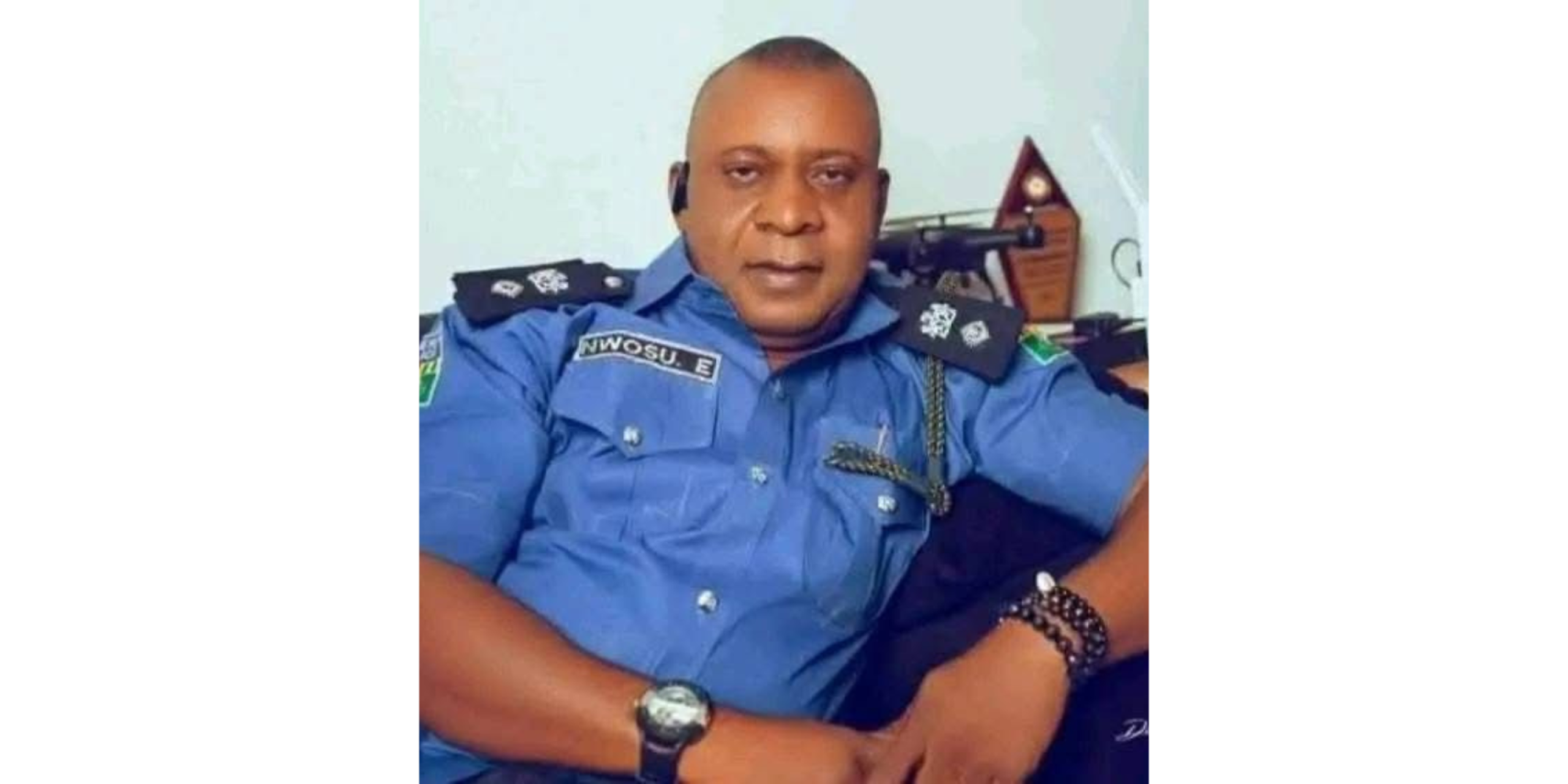The Fall of a Rogue Policeman: Why CSP Ekene Nwosu’s Death Should Be a Turning Point for Nigerian Policing
The death of Chief Superintendent of Police (CSP) Ekene Nwosu has sparked a wave of emotions across Nigeria—particularly in Akwa Ibom State, where his shadow loomed large over many families and communities for years. From condemnation to quiet relief and even celebration, the reaction to his death is not typical of a public servant passing on. But CSP Nwosu was no ordinary policeman. His legacy, if it can be called that, is a chilling reminder of how deeply entrenched impunity and state-backed violence have become in Nigeria’s security apparatus.
The fiery reaction from human rights lawyer Inibehe Effiong has once again brought to light the egregious acts CSP Nwosu allegedly committed while in uniform. Described as “murderous,” “callous,” and “a devil” by Effiong, Nwosu’s death has sparked a long-overdue national conversation about the rot in the Nigerian police force, the political alliances that enable rogue officers, and what kind of accountability—if any—exists for those who brutalize the people they are meant to protect.
YOU MAY READ
Court Sentences Late Nigerian Gospel Singer Osinachi’s Husband to Death by Hanging
To understand why CSP Ekene Nwosu’s death has caused so much controversy, one must first examine the nature of his career. Nwosu served as the Officer-in-Charge of the Anti-Robbery Squad (SARS) at the Akwa Ibom State Police Command. His tenure coincided with one of the darkest chapters in the state’s human rights history.
Accounts from victims, journalists, lawyers, and civil rights groups paint a disturbing picture: a man who acted with near-total impunity, allegedly orchestrating raids, illegal detentions, and extrajudicial torture. According to Inibehe Effiong, Nwosu “went to extremes to dehumanize his many victims.” These were not isolated incidents but part of a broader pattern of abuse under the pretext of crime fighting.
“He subjected innocent people in Akwa Ibom to the most barbaric forms of dehumanisation,” Effiong said, echoing the sentiments of dozens of survivors who have come forward since Nwosu’s death.
Inibehe Effiong, a prominent human rights lawyer and activist, has been one of the most consistent voices challenging police brutality in Nigeria. His law firm has handled numerous cases involving victims of Nwosu’s alleged abuses. Effiong’s statement on the death of the controversial officer was scathing and unapologetic:
“Ekene is a perfect example of a rogue police officer… He had no respect for lawyers, no respect for human rights, and held the Judiciary in contempt.”
Effiong’s words may seem harsh, but they reflect a deep frustration shared by many Nigerians who feel abandoned by a justice system that often protects the powerful and punishes the powerless.
That CSP Nwosu was allowed to operate with impunity for so long, despite several court rulings against him, speaks volumes. It is not merely a failure of oversight—it is a systemic endorsement of brutality, as long as it serves the interests of those in power.
Effiong also raised concerns about the political cover that allowed Nwosu to flourish within the police force. Describing him as a “mercenary for oppressive and corrupt politicians,” Effiong alleges that Nwosu was frequently used to target political enemies and suppress dissent in Akwa Ibom.
This isn’t unusual in Nigeria. Over the years, the police have increasingly become tools in the hands of politicians—used to intimidate, detain, or even eliminate opponents. Officers like Nwosu, who allegedly derived their authority not from the rule of law but from political patronage, represent the extreme manifestation of this dangerous trend.
YOU MAY READ
The Death of a Visionary: Domestic Violence Allegations Rock Delta State Following the Tragic Demise of Governor’s Aide Shimite Winifred Bello
It’s this political backing that may have enabled Nwosu to defy internal police discipline and external judicial accountability for so long. “Successive Commissioners of Police failed to checkmate him,” Effiong said. “Ekene had so much power in the State.”
While CSP Nwosu may be dead, the scars he left behind remain painfully vivid. Families whose loved ones were detained, tortured, or allegedly killed under his watch are still waiting for justice.
Consider the many unresolved cases documented by NGOs and legal firms in Akwa Ibom: young men rounded up in mass raids, tortured in dingy cells, and left without trial. Families were forced to pay bribes for the release of relatives, some of whom never made it home.
Several of these cases made it to court—and in many of them, the courts ruled in favor of the victims. Yet Nwosu remained in service, untouched, and in some cases, even promoted.
The disconnect between judicial rulings and police accountability is one of the greatest threats to Nigeria’s democracy. When rogue officers can ignore court orders with impunity, it erodes public trust in both the police and the judiciary.
Effiong claims that Nwosu was finally transferred out of Akwa Ibom to Ekiti State by a former Commissioner of Police who stood up to him. Ironically, Nwosu reportedly celebrated the death of that Commissioner. A dark twist, as fate would have it, is that Nwosu himself died not long after that transfer.
Effiong framed this as a lesson to others in uniform:
“Ekene was a devil, and I hope that other rogues in uniform will realise that they will die one day.”
In Nigeria, where the culture of impunity is sustained by belief in one’s own invincibility, this message is powerful. Effiong’s statement is not a celebration of death—it is a call to reflection. What will you be remembered for? Will it be for justice and service, or terror and tyranny?
Since news of Nwosu’s death broke, the public reaction has been telling. Many on social media shared personal testimonies of trauma allegedly inflicted by the former SARS officer. Some openly expressed relief, while others—perhaps uncomfortable with the celebration of a human being’s death—called for restraint.
But this split in public sentiment is itself part of the problem. Nigeria has for too long failed to distinguish between authority and tyranny. Officers who brutalize citizens are often protected by state institutions and rewarded with promotions.
It’s no wonder that many see death as the only true form of justice in such cases—an indictment of a system that allows men like Nwosu to retire with full benefits while their victims live with permanent physical and emotional scars.
YOU MAY READ
Nigerian Soldier Sentenced to Death by Hanging for Girlfriend’s Murder
The Nigerian Police Force has long been accused of corruption, brutality, and inefficiency. Despite repeated promises of reform—from the disbandment of SARS to the establishment of Police Complaint Response Units—little has changed.
Nwosu’s career is a prime example of why reform efforts have failed. Even after multiple complaints, judicial rulings, and media reports, he remained in office. Until the very end, he wielded power with little oversight.
Unless these questions are answered, and systemic changes implemented, the death of CSP Nwosu will be just another footnote in Nigeria’s long history of police brutality.
The lesson here is not simply that rogue officers will one day die. Mortality is universal. The real lesson is about accountability, legacy, and the kind of society we want to build.
As Inibehe Effiong stated, the most haunting question remains: what will you be remembered for?
For CSP Ekene Nwosu, it seems that his memory will be one of terror, not honor. His death, while unceremonious, might serve a higher purpose if it becomes a turning point—a cautionary tale for those who still believe that a badge grants them immunity from justice.
For those still in uniform, especially those abusing their authority under the guise of law enforcement, the message is clear: impunity has an expiration date. And when that day comes, the public won’t remember your rank—they’ll remember your record.
Let it be clear: celebrating a person’s death is not ideal in any civil society. But when institutions fail, and justice is perpetually denied, people cling to symbolic victories.
The death of CSP Ekene Nwosu is one such moment. It’s not justice, but it is a powerful wake-up call. If Nigeria is to move forward, it must finally confront the hard truths about policing, impunity, and the need for reform. Not with speeches, not with committees—but with real, enforceable action.
Only then can we hope to build a society where police protect the people—not prey on them.





